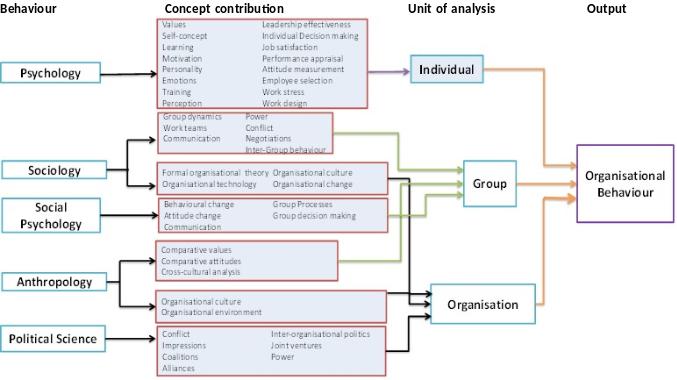Organisational behaviour has become an increasingly discussed subject in the business and academic world. With the advent of globalisation, mobility in businesses has paved new ways to study the relationships between individuals and groups in several organisational contexts. In general terms, organisational behaviour refers to the study of human behaviours in organisations. Besides focusing on the individual aspects, it is also related to the relationships interactional aspects between the individuals and the group in an organisational context. The organisation is therefore subjected to assessments, and so are the underlying relationships between the organisation and the environment (McKenna, 2000). This chapter provides a brief description of organisational behaviour and how leadership can influence the organisational setting at large. Furthermore, this chapter describes the relationships between certain variables which influence leadership, and how leadership can facilitate better performance in an organisational context. Organisational behaviour is described as a social science rather than a natural science. Whilst, it adopts a multi-disciplinary perspective, it deals with phenomena of human conditions, which is more complex than the phenomena which encompasses the physical world. Often, it meets challenges in identifying, defining, conceptualising, assessing, and predicting relationships between concepts concerning human conditions and physical world (McKenna, 2000). To get a better understanding, Figure 1 illustrates the multi-disciplinary perspectives involved in the development of organisational behaviour studies.

Figure 1: Contributions to the study of Organisational Behaviour
Source: Adapted from Robbins (2003, p.11); Ivancevich et al (2008, p.9)
Figure 1, mentioned in the previous page, offers an overview of the major contributions to the organisational behaviour studies. Therefore, organisational behaviour in other words, can be considered as an applied behavioural science which is built on the contributions from several disciplines, principally psychology, social psychology, sociology, anthropology and political science. Psychology’s contributions have been typically at the individual or micro level analysis, whilst the other disciplines have contributed to the macro level analysis or concepts such as group processes and the organisation (Robbins et al, 2013). Therefore, organisational behaviour can be considered as a field of study which has an unique area of expertise with a common body of knowledge. It studies not only the three determinants of behaviour in an organisational setting such as individuals, groups and structure, but it also employs the knowledge gained from the individuals, groups and structures on behaviour in order to make the organisations function effectively (Robbins et al, 2013).

